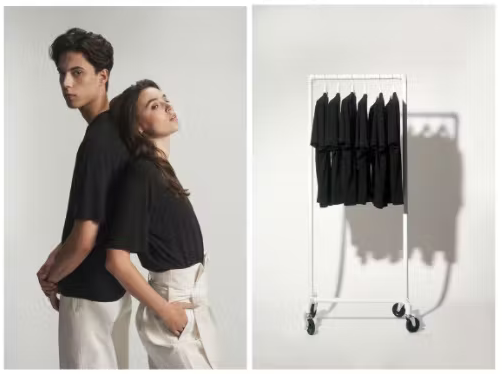In a breakthrough innovation, a textile innovation company, Evrnu®, announced the launch of the world’s first high-performance, recyclable lyocell material made entirely from cotton textile waste: 100% NuCycl r-lyocell. The use of cotton textile as a raw material ensures this bio-based fiber replaces virgin cellulosic and other plastic-based textile materials while maintaining recyclability. Evrnu has even launched a premium t-shirt made with this new fiber designed by Carlos Camos.
Millions of tons of textile waste end up in landfills and incinerators every year, and Evrnu, through its various sustainable measures, is carving ways for them to be brought back into the value chain. Evrnu’s chemical recycling solutions use textile waste as a resource to recycle them into materials that outperform virgin cellulosic and plastic textiles.
100% NuCycl r-lyocell is Evrnu’s first commercially available fiber that uses cotton textile waste diverted from landfills as its only resource and replaces up to 90% of current textile fibers including cotton, polyester, nylon, and other man-made cellulosic fibers.
“We have at least a 20-year push to innovate around climate change to make up for the past 100 years of collateral industrial damage,” said Stacy Flynn, co-founder, and CEO of Evrnu. “Our team and partners are dedicated and aligned to outperforming and scaling textile recycling solutions to bring our industry into balance with natural systems.”
Evrnu’s 100% NuCycl r-lyocell exceeds the performance of high tenacity nylon and polyester in terms of strength, comfort, and durability while being ten times more recyclable. \
In order to develop this 100% bio-based fiber, Evrnu modified its manufacturing methods that processed virgin wood to be able to process textile waste. By tweaking its technologies to fit into the existing manufacturing infrastructure, the company is set to scale its chemical recycling solutions for the fashion & apparel industry.
“For the first time in the history of the textile industry we can now outperform 90 percent of the market using what is currently perceived as waste,” said Christopher Stanev, CTO of Evrnu. “Since we founded Evrnu, we have proven our technologies not only work but are scalable using existing infrastructure; imagine what our industry will look like when we are done.”
Evrnu has raised funding of $31 million so far and is currently building a new facility in the Southeast US to deploy its fiber regeneration technologies at a commercial scale. The new facility has the capacity to process 17000 metric tons of pulp and 2000 tons of fiber per year. Evrnu is also looking forward to collaborating with brand partners in the coming months to popularize the use of 100% NuCycl r-lyocell and build a sustainable, closed-loop ecosystem for the textile industry.













